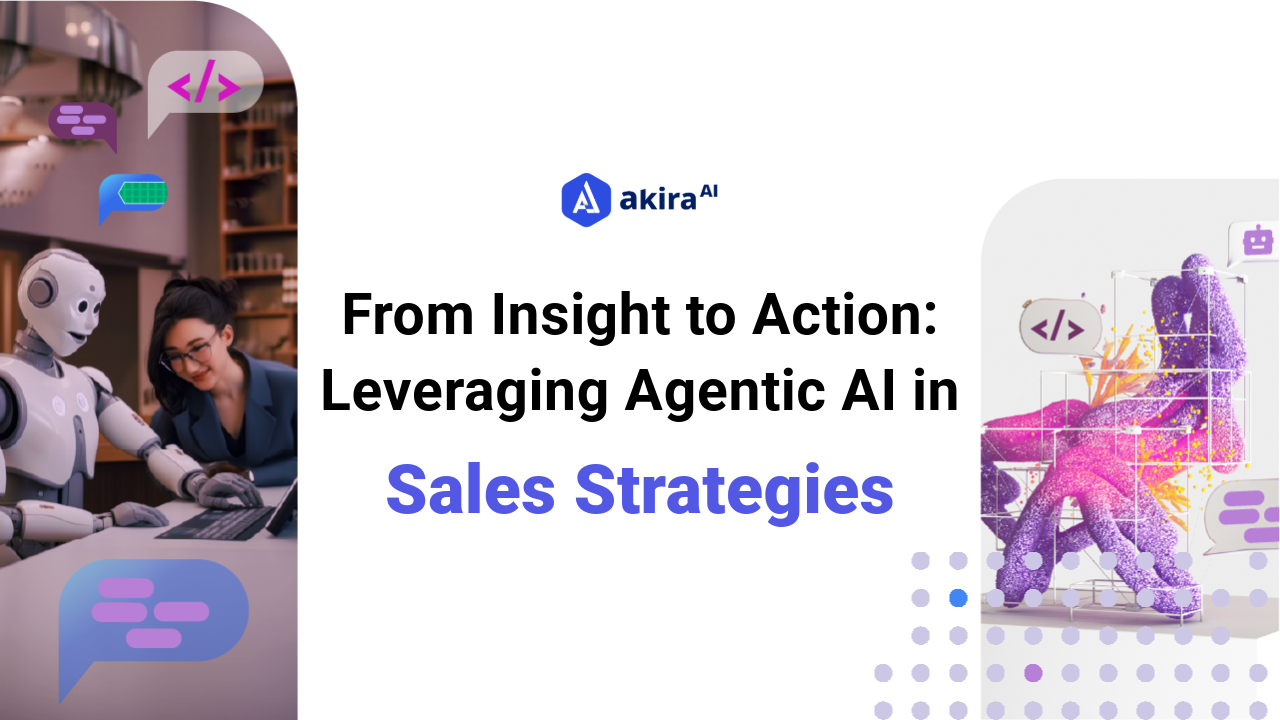Today's sales professionals find themselves in a challenging environment where customer expectations are higher than ever. Relying solely on traditional methods can leave teams feeling overwhelmed and underprepared. That's where Agentic AI comes in—a transformative force that helps streamline sales processes and enhance customer interactions.
This blog will explain how AI agents redefine the sales terrain, emphasizing use cases, benefits, and emerging trends. With agentic AI applied, sales teams can become more efficient again and provide value prop and experience to help the organization attune for the long term.
Understanding the Need for Agentic AI in Sales
Sales processes have become multifaceted due to increased levels of customer needs, digital media, and the volume of information. Most traditional approaches require support to stay responsive to the expectations of the contemporary client, who prefers to communicate one-on-one and with near-instantaneous interaction. The increasing competition in virtually every industry further intensifies the need for efficiency and effectiveness in sales.
Agentic AI offers a solution to the above problems through processing large data sets and repeating cognitive functions, showing and explaining results that improve decision-making. With these capabilities, sales teams can operate more strategically, focusing on building relationships rather than getting bogged down in administrative duties.
How Does Agentic AI Transform Sales for Sellers and Buyers?
For Sellers:
-
Streamlined Processes: AI Agents take care of the most tedious and time-consuming sales tasks so the sales professionals can concentrate on relationship management and sales conversion.
-
Enhanced Insights: From customer behavior, buying patterns, perceptions, and transactions, this multi-agent system gives sellers proper suggestions that affect sales presentations and trends.
-
Increased Efficiency: These agents can process multiple incoming requests and, as a result, offer quick answers that can overwhelm a company's sales divisions.
-
Improved Lead Qualification: Agentic AI can prioritize or even rate leads based on specific criteria to help sellers focus on high-potential opportunities.
-
Sales Performance Monitoring: These agents can monitor the figures and analytics of individuals and teams to get references or hints on changes. Such a constant feedback loop sustains and indeed acts to develop the importance of organizational responsibility further.
For Buyers:
-
Personalized Experiences: AI agents use data to send appropriate messages and make recommendations based on customer needs and past activity. This level of personalization boosts the buying experience and makes the customer feel valued.
-
24/7 Availability: Customers can access support and information anytime, ensuring their needs are met promptly. They can ask questions about the products and even make orders at odd times via the chatbots.
-
Informed Decisions: This multi-agent system can analyze buyers' history and preferences, providing curated options that align with their needs. Buyers can make better-informed choices with access to detailed product information, comparisons, and customer reviews.
-
Seamless Communication: These agents help establish smooth connections between sellers and buyers to handle all their inquiries well.
-
Proactive Problem Solving: While using the data, AI agents can predict the challenges that customers face, and thus, the sellers can act accordingly to mitigate churn and improve the whole customer experience.
Akira AI For Sales: Multi-Agent in Action
 Fig 1: Akira AI For Sales Operation
Fig 1: Akira AI For Sales Operation
Agentic AI can incorporate machine learning and natural language processing to interface with the users to crunch numbers and generate reports. The core functionalities include:
-
Data Analysis: Customer data helps these agents define trends and opportunities with the outside world. From past sales, relations, and experiences of other customers, they may see ways in which trends can be altered.
-
Automated Communication: These AI agents engage and work with customers and leads with the help of chatbots or by sending them emails. In case of no response, they then send messages, follow-up emails, or email reminders to the prospect.
-
Performance Monitoring: This multi-agent system tracks selling activities and provides feedback on performance and recommendations in real-time. It allows the sales team to correct their mistakes and increase the probability of making a sale.
-
Integration with Existing Systems: Due to the fact that agentic AI can quickly find and engage other utilities like CRM platforms, the performance of those tools can be enhanced. This makes it possible for the sales teams not to look for information compiled from other resources on their own, enhancing effectiveness.
-
Learning and Adapting: AI systems adapt to their user and the processes they are involved in. They enable a company's sales department to be on the lookout for trends that may be useful for customers and likely to arise in the future.
Exploring the Benefits of Agentic AI in the Sales Sector
The benefits of implementing agentic AI in sales are manifold:
-
Improved Efficiency: Relieves time-consuming pressures on daily operations so that the sales teams can make better schedules. The benefits that accrue from these efficiencies may increase sales volume and staff morale.
-
Enhanced Decision-Making: The predictive analysis makes it possible for the sales personnel to make the right decisions while adopting the path of predictive analysis. It enables the teams to advance solutions based on existing markets and customers.
-
Greater Customer Satisfaction: Personalized interactions and timely responses foster stronger client relationships. When customers feel valued and understood, they are more likely to remain loyal and recommend the brand to others.
-
Cost Savings: Organizations can reduce operational costs by automating repetitive tasks and streamlining processes. This efficiency allows for the reallocation of resources toward high-impact initiatives.
-
Increased Scalability: AI Agents can assist organizations in responding to increased workload due to time-intensive activities. These agents are applicable anywhere the sales teams are expanding, or there is a significant turnover.
Applications of Agentic AI Across Sales Operations
 Fig 2: Use Cases of AI Agents For Sales Operations
Fig 2: Use Cases of AI Agents For Sales Operations
Agentic AI enhances various sales activities, benefiting almost all functions in the sales process.
-
Lead Generation and Scoring
AI agents can pick potential leads and judge their quality so that they can focus on the proper list of prospects for the salespersons. These agents make contacting leads for the right messages easier by rating leads according to engagement and other parameters.
-
Personalization
The multi-agent system enables tailored communications and offers based on customer preferences and past interactions. This personalization increases engagement and conversion rates, making customers feel valued.
-
Monitoring Sales Calls
These agents can listen to recorded sales calls and give out advice as well as facts about future conduct. They can distinguish key issues, customers' feelings, potential, and gaps that could lead to improved performance of representatives.
-
Sales Prospecting
These agents help identify and qualify leads, making prospecting much easier. Potential clients expected to be converted into high-value customers should be instantly recognized, allowing the sales personnel to cover higher-value prospects.
-
Predicting Future Sales
Predictive analytics enable one to predict future sales and customer behaviors so that one can act appropriately. As such, by knowing what could happen in the future, the salespeople can change their behavior to fit the situation.
-
Customer Segmentation
The multi-agent system performs classification with respect to the customers based on different parameters that further become marketing strategies. Segmentation gives an assurance that the message sent out can be easily digested by the intended receiver.
-
Automated Emails
These agents help tailor campaign emails to provide targeted information to consumer segments, improving efficiency. The follow-up emails help the marketer know that the leads are not cold each time they want to convert them.
-
Voice Analytics
The details of the voice interaction determine the customers' emotional state, which AI agents use to improve the interaction strategy. Articulating the messages and strategizing the action plans for the sales teams helps with this analysis.
-
Predictive Analytics for Upselling and Cross-Selling
Agentic AI can go through cross-selling and up-selling data according to customer behavior and activities on the website. With precise recommendations, the sales departments can further upstream the average sales per transaction.
-
Handle Routine Inquiries and Follow-Ups
These agents are capable of handling repetitive queries, thus allowing the sales team to focus on complex grievances. It enhances efficiency, making solutions time-bound for the customers.
-
Sales Process Optimization
The multi-agent system recognizes problems within the context of the current sales model and proposes solutions. Efficiencies improved across one or many aspects of an organization can improve sales effectiveness.
-
Content Optimization for Sales
These agents drive optimization and efficiency analysis of the business's sales content. It ensures that the sales content published is useful to the target groups.
-
Contract Analysis and Management
In a multi-agent system, contract administration and compliance can be simplified. Since much of the actual contract review and tracking of relevant deadlines can be carried out by the system, it frees up buyer and seller time for more productive ventures.
-
Extracting Contact Details
AI agents automate the extraction of relevant contact information, improving data quality. Accurate data ensures that sales teams can reach the right prospects. -
Preparing for Sales Calls
These agents assist in the collection of data that is necessary for the sales team to be ready. This acts out the quality of several interchanges and the consequences.
-
Recurring Information Updates
The AI-based solution helps update customers' information and ensure that the accuracy of data located in a CRM environment is on point. While this consistency is extremely important in general, it specifically rules the field of sales strategies.
-
Sales Task Automation
Routine tasks are automated, increasing productivity and allowing focus on high-impact activities. This automation helps the sales teams within businesses to function more effectively.
-
Churn Prediction and Prevention
AI agents use data mining techniques to forecast customer defection and offer solutions for customer retention. With the help of a behavior change score, the sales teams know the customers are at the edge of shifting to other brands and, hence, can act before it happens.
-
Competitive Analysis
These agents collect and analyze the data concerning the competitors and then make strategic decisions with the help of obtained data. The sales team then uses this information to help them market themselves effectively.
Steps for Sellers to Get Agentic AI-Ready
To effectively integrate agentic AI into sales operations, sellers should follow these steps:
- Assess Current Processes: Determine where or how automation and AI agents can make a difference. Knowing how work is being done will help identify which areas should benefit most.
- Choose the Right Tools: Select agents that align with business goals and integrate seamlessly with existing systems. Researching various platforms and their capabilities is crucial for making informed decisions.
- Train Sales Teams: Equip sales professionals with effective training in this multi-agent system. The training may include details about technical matters and best practices to leverage AI for sales strategies.
- Monitor and Optimize: Regularly track the performance levels of these agents and optimize results where necessary. These relatively slow, constant improvements mean the sales team is always prepared to adapt to a new change.
- Foster a Culture of Innovation: Implement these AI agents as actively as possible and take feedback for review. A culture supporting such innovation will spur better utilization of these agents.
How does an Agentic AI solution Empower Sellers?
 Fig 3: Agentic AI Solution Empowers Sellers
Fig 3: Agentic AI Solution Empowers Sellers
Akira AI harnesses the power of agentic AI to revolutionize the sales process, equipping sellers with the tools they need to thrive in a competitive landscape. Here's how it empowers sales professionals:
-
Intelligent Insights
Akira AI focuses on customer data and looks for patterns, trends, and relevant advice on how to sell to individual clients. They show up-selling and cross-selling opportunities, which drive the selling potential to its maximum. This insight enables salespeople to target customers for effective interaction using quantifiable information.
-
Automation of Routine Tasks
Tasks such as appointments and bookings or inputting and updating records are managed via software and apps, which removes the monotony of developers' reps' sales work. It is efficient and reduces time wastage while reducing the chances of human-prone mistakes in communication.
-
Data-Driven Decision-Making
The platform incorporates predictive analysis to predict sales so sellers can make appropriate decisions. This enables teams of people to adapt the approaches used from one period to another depending on market forces and customer tastes. Optimizing the supply chain leads to better attention to higher quantity leads.
-
Enhanced Customer Understanding
This AI solution will provide recommendations for customer interactions by analyzing the customer data. The internet precedes needs, enabling sellers to meet needs even before they realize them. This action helps to build a relationship and extend customer loyalty.
-
Performance Tracking and Feedback
Continuous monitoring of key performance metrics provides real-time feedback to sellers. It helps identify strengths and areas for improvement, leading to targeted training opportunities. The feedback loop encourages a culture of continuous improvement and excellence.
-
Improved Communication
Akira's platform provides a snapping and efficient means by which the sellers and customers can communicate with each other. Concerning sentiments, this platform suggests how to sell by changing the communication between sellers and buyers.
-
Strategic Planning Support
Territory management is made easier by the insights given by Akira AI Agents as they identify high-impact fields. They support a reasonable setting of targets, define approaches that reference market trends, and then provide an adequate response regarding sales.
-
Integration with Existing Systems
The platform provides a common hub for all the data that has to be used while remaining compatible with conventional CRM and sales suites. Integrating these two systems enhances working processes and the productivity of the salespeople. It also makes knowledge sharing with other members of the specific team through direct interaction during working sessions.
Future Agentic AI Trends in Sales
As technology evolves, so will the capabilities of agentic AI in sales. Future trends may include:
-
Increased Integration: The multi-agent system will increasingly converge onto different sales platforms, enhancing usability and efficiency. It will smoothen the workflow and improve accessibility to critical information.
-
Greater Personalization: These AI agents will offer even more personalized customer experiences aided by analyses of customers' needs. Thanks to the newer and more advanced data sources, these agents can give nearly more detailed suggestions for action.
-
Enhanced Collaboration: The AI-based solution will further enhance how sales teams are connected and, more importantly, share information across teams. Improved collaboration tools will also allow seamless working and a combination of effort with little or no compromise.
-
Voice-Activated AI: In the future, it is possible that AI agents can be controlled and operated solely by voice, which means that sales professionals can speak to them without having to type anything using their hands. This capability will improve efficiency, most notably during the sale calls received due to high demand.
-
Advanced Predictive Analytics: Future AI solutions will refine the predictive analysis method to the sales team's advantage in foreseeing market expectations and customer necessities.
-
Ethical AI Use: As Agentic AI becomes more prevalent, discussions around ethical use will grow. Sales organizations must ensure that all AI applications meet ethical standards and customer expectations.
Conclusion:Agentic AI In Sales
Adopting Agentic AI in sales is no longer a luxury but is necessary for organizations aiming to thrive in a competitive landscape. By transforming processes, enhancing customer experiences, and providing actionable insights, AI agents empower sales professionals to achieve their goals more effectively. Embracing these technologies will be crucial for businesses looking to stay ahead in the ever-evolving sales environment.


